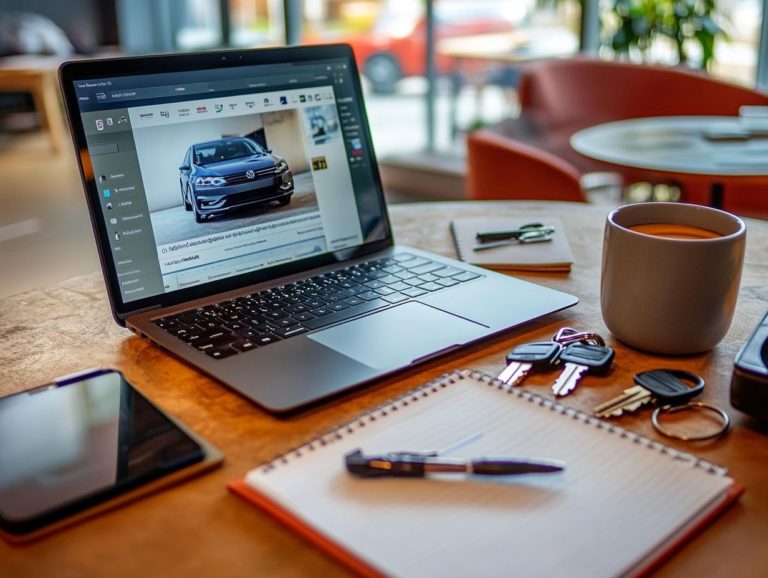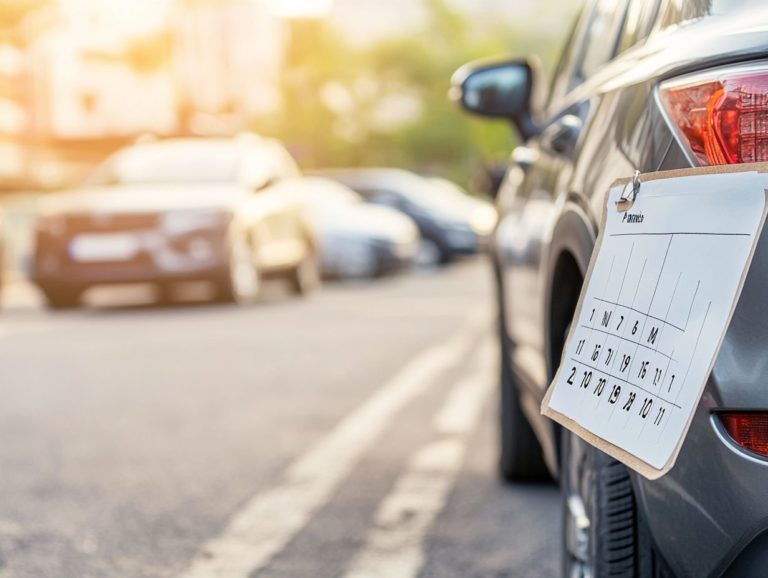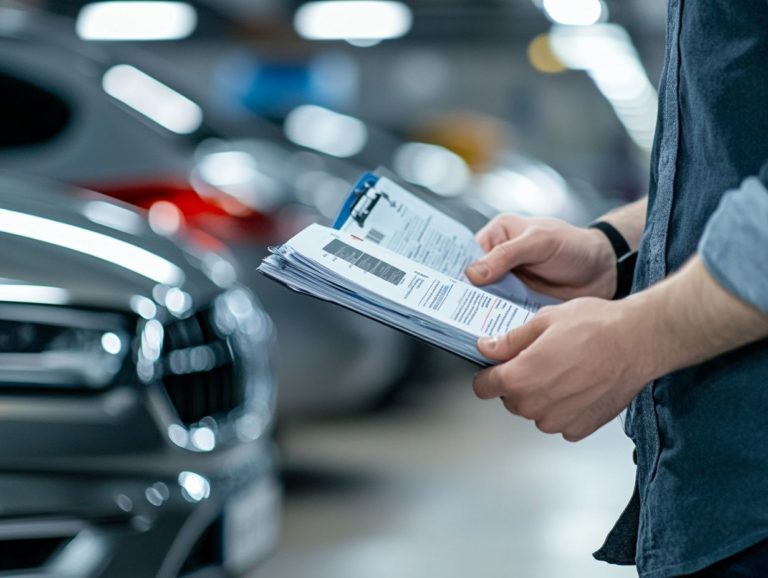How to Handle Used Car Paperwork
Buying a used car is an exhilarating journey, but it can also feel overwhelming, particularly when it comes to the paperwork. Understanding the documents involved is vital to ensure a smooth transaction and protect your money.
This guide highlights the crucial steps to take before making your purchase, including thorough research on both the vehicle and the seller, as well as identifying the essential documents required during and after the sale.
Arm yourself with the knowledge necessary to maneuver through the paperwork, ensuring a smooth experience as you drive off in your new set of wheels.
Contents
- Key Takeaways:
- Understanding the Paperwork Involved in Buying a Used Car
- Steps to Take Before Purchasing a Used Car
- Inspecting and Test Driving the Car
- Paperwork to Complete During the Purchase
- Handling Paperwork After the Purchase
- Frequently Asked Questions
- 1. What paperwork do I need when buying a used car?
- 2. Can I transfer the registration and title at the same time?
- 3. How do I know if I need a bill of sale?
- 4. Do I need to get a vehicle inspection before transferring ownership?
- 5. What is a lien and how does it affect the transfer of ownership?
- 6. Can I handle all the paperwork by myself or do I need a professional?
Key Takeaways:

- Research the vehicle and seller before purchasing a used car. This helps ensure a smooth and transparent transaction.
- Complete necessary paperwork during the purchase, such as a bill of sale and title transfer, to legally transfer ownership of the vehicle.
- After purchase, register and insure the vehicle, and keep all documents organized and up to date for future maintenance and potential reselling.
Understanding the Paperwork Involved in Buying a Used Car
Understanding the paperwork involved in purchasing a used car is essential for ensuring a smooth transaction and protecting your investment. From obtaining the car title to transferring ownership, you’ll encounter specific legal documents required by the Department of Motor Vehicles (DMV), which can vary by state.
Familiarizing yourself with documents such as the bill of sale, proof of insurance, and the vehicle identification number (VIN) which is a unique code that identifies your car is crucial. This knowledge not only aids in verifying the vehicle’s history but also helps you avoid potential issues later.
Types of Documents and Their Importance
When you re purchasing a used car, it’s important to gather several key documents to ensure clear ownership and the legality of the transaction.
Focus on the car title, bill of sale, and vehicle history report. These documents act as crucial safeguards for both you and the seller during the ownership transfer process.
The car title verifies legal ownership and protects you from any claims to the vehicle from previous owners or lienholders. A bill of sale is a document that acts as a receipt for the purchase, detailing important information about the car and the sale.
A vehicle history report is invaluable, offering insights into the car’s past and flagging any accidents or title issues that could affect its value or safety. Collectively, these documents help you meet DMV compliance requirements and foster a smoother, hassle-free transition of ownership.
Steps to Take Before Purchasing a Used Car
Before you dive into purchasing a used car, taking a few key steps can make your car-buying experience thrilling!
Begin with comprehensive research on both the vehicle and the seller to set a solid foundation for your buying journey.
Researching the Vehicle and Seller

Thoroughly researching the vehicle and its seller is an essential first step in your buying journey, ensuring you make a sound investment and avoid potential scams.
Start by checking vehicle history reports; these can unveil past accidents, title issues, and even service records that are crucial to your decision-making process. It s also wise to compare prices from various private sellers and dealerships to get a true sense of the market value.
Ensuring the seller’s reputation is vital; reviews and testimonials can offer valuable insights into their reliability. Understanding the car’s maintenance history is key as well, as it can highlight any recurring issues that might not be immediately visible.
By taking these steps, you ll navigate the purchasing process with greater confidence and clarity.
Ready to buy your dream car? Start your research today!
Inspecting and Test Driving the Car
Inspecting and test driving a used car are important steps in your purchasing journey, offering vital insights into its overall condition and performance.
Be on the lookout for signs of wear and tear think uneven tire tread, rust, or fluid leaks which could point to hidden problems. Reviewing the vehicle’s maintenance schedule is just as important. A well-maintained car can save you from future headaches and unexpected expenses.
A thorough test drive allows you to evaluate everything from comfort to handling. It also helps you catch any unusual noises that might indicate trouble. These steps play a significant role in ensuring you make an informed purchase, paving the way for years of reliable driving ahead.
Paperwork to Complete During the Purchase
Completing the necessary paperwork when purchasing a used car is essential for a legally sound transaction. Key documents like the bill of sale and title transfer are crucial, serving as the foundation of your purchase and protecting your investment.
Bill of Sale and Title Transfer
The bill of sale and title transfer are among the most vital documents in purchasing a used car. They not only formalize the transaction but also establish your ownership.
These documents serve as proof of purchase and detail essential terms like the sale price, vehicle condition, and any applicable warranties. For the title transfer, ensure that the seller provides a clear title, free from any legal claims on the property. This transaction typically involves completing specific forms and paying requisite fees at the Department of Motor Vehicles (DMV).
Depending on your state, you may need to present identification, proof of insurance, and a completed application for title transfer. This guarantees a smooth transition of ownership, so don t wait!
Vehicle History Report and Warranty Information

Obtaining a vehicle history report and understanding warranty information are essential steps to shield yourself from unforeseen issues and financial liability down the line.
This report unveils critical insights into past accidents, title issues, and details about previous ownership that might slip under your radar. By uncovering whether a vehicle has experienced a serious collision, you can better assess its true condition and potential repair costs, which can significantly influence your purchasing decision.
Review warranty terms and conditions, especially for dealership purchases, as they clearly outline what is covered and for how long. Grasping these details protects you against potential hidden costs, giving you peace of mind when making such a significant investment.
Handling Paperwork After the Purchase
After you purchase a used car, it s essential to manage the necessary paperwork without delay. This includes registering your vehicle and securing car insurance to meet legal requirements, ensuring a smooth transition into ownership.
Registering and Insuring the Vehicle
Registering and insuring your vehicle is a crucial step in the post-purchase journey, ensuring you meet DMV requirements while safeguarding your financial investment.
This process grants you the legal right to drive and solidifies your ownership, marking a significant milestone in effective vehicle management. Keep in mind that requirements can differ widely from state to state; some may mandate emissions testing, while others impose fees that vary based on your vehicle’s age and type.
It’s essential to present proof of insurance during registration, as this protects you from potential liabilities. You’ll find a variety of car insurance options available, from comprehensive to liability coverage, each designed to cater to your unique needs. This way, you can ensure that you’re adequately protected as you hit the road.
Keeping Records and Maintaining the Car’s Documents
Keeping accurate records and maintaining your car’s documents is crucial for protecting your investment. It also helps you navigate lemon laws.
A meticulously detailed maintenance schedule enhances your vehicle’s performance and boosts its resale value. Potential buyers prefer well-documented cars, viewing them as reliable options with transparent histories.
Organized records simplify the process of filing an insurance claim with insurers. Familiarize yourself with lemon laws, which protect buyers from vehicles with persistent defects. This knowledge allows you to seek recourse if needed, emphasizing the importance of keeping good records for your peace of mind and financial security.
Frequently Asked Questions

1. What paperwork do I need when buying a used car?
When purchasing a used car, you will need the vehicle’s title, registration, and any transfer documents or bill of sale from the previous owner. You may also need proof of insurance and a valid driver’s license.
2. Can I transfer the registration and title at the same time?
Yes, you can generally transfer the registration and title simultaneously. This typically requires completing a title transfer form and submitting it to your local DMV office with the necessary fees and documents.
3. How do I know if I need a bill of sale?
A bill of sale outlines the sale of a vehicle between a buyer and seller. In some states, it is required when transferring ownership. It s always wise to have one to protect both parties in the transaction.
4. Do I need to get a vehicle inspection before transferring ownership?
An inspection is not always required before transferring ownership, but we strongly suggest it. An inspection can spot problems before you buy and give you peace of mind.
5. What is a lien and how does it affect the transfer of ownership?
A lien is a legal claim on a vehicle used to secure a debt, typically a loan. If there s a lien on the vehicle, the seller must pay off the debt before transferring ownership to the buyer. Always check for liens on a used car before purchasing it.
6. Can I handle all the paperwork by myself or do I need a professional?
You can manage the paperwork for a used car on your own, but we recommend getting help from a professional, like a title service or DMV agent. Additionally, knowing how to verify a used car’s ownership can ensure all necessary documents are filled out accurately, saving you time and potential headaches.






